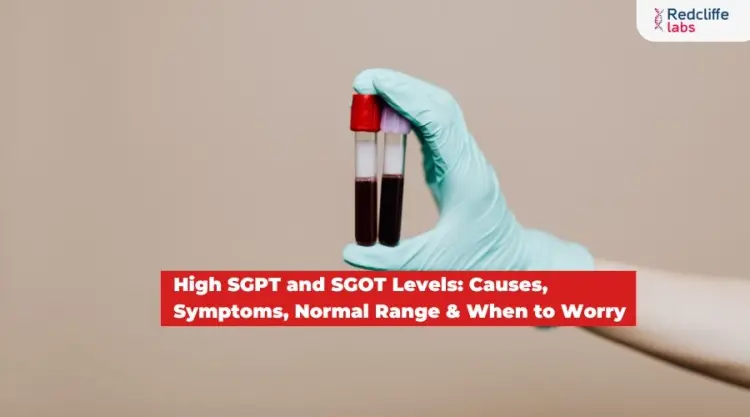Blood
Unlock special
discount on
this package
Login to Unlock 🔓
NABL Accredited lab*

Booking Benefits Unlocked Worth FREE 799

Report Consultation

Diet Plan
*Available once your report is generated.
At Redcliffe Labs, we have a single goal: to give India its right to quality diagnostics.
Customers served
Tests Processed Everyday
Cities
Collection Centres
World Class In-house Labs
Home Collection Experts
1 Test Parameters
Vitamin E (Tocopherol)
1 PARAMETER INCLUDED
1 PARAMETER INCLUDED
- Vitamin E (Tocopherol)
Top Booked Health Checkup Packages
Reports in 12 hours
|Parameters 94
Reports in 12 hours
|Parameters 89
Reports in 12 hours
|Parameters 96
Reports in 12 hours
|Parameters 96
Reports in 12 hours
|Parameters 90
Verified by Medical Expert

WRITTEN BY
Sheena Mehta

MEDICALLY REVIEWED BY
Dr. Pradeep Lodha
Table of Content
Introduction to Vitamin E (Tocopherol) Test
A vitamin E test is prescribed to check the amount of vitamin E in your blood. Vitamin E, called Tocopherol, is an important antioxidant that helps protect cells from damage and supports immune function, skin health, and vision.
A vitamin E tocopherol test is a blood test usually recommended to measure the level of tocopherol in your blood. Many foods, such as vegetable oils, nuts, seeds, avocados, and green leafy vegetables, help increase the body's intake of vitamin E. Low levels of vitamin E can cause issues like muscle weakness, vision problems, and impaired immune function.
If your doctor has suggested a vitamin E test based on symptoms, book a vitamin E test from Redcliffe Labs at affordable rates. We provide home blood sample collection service to save your time and get accurate reports within a given time. This makes it easier for individuals to access testing services.
Role and importance of Vitamin E
Vitamin E is a nutrient crucial in maintaining overall health. It acts as an antioxidant that protects cells from oxidative stress and damage caused by free radicals, thus reducing the risk of chronic diseases such as heart disease and cancer. Additionally, Vitamin E supports immune function, helping the body combat infections and diseases.
Furthermore, vitamin E contributes to skin health. It helps maintain healthy eyes and blood circulation. Overall, its adequate presence in the body ensures optimal health and well-being.
Foods Rich in Vitamin E
Listed below are foods rich in vitamin E:
- Nuts and seeds
- Oils such as sunflower oil, olive oil, and wheat germ oil
- Fruits such as avocados, kiwis, mangoes, and blackberries
- Vegetables such as spinach, Swizz Chard, broccoli, and red pepper
- Whole grains such as wheat and oats
- Fortified cereals
- Legumes such as peanuts, soybeans, and black beans
Test Details:
| Also known as | Tocopherol test, alpha-tocopherol test, vitamin E, and serum |
| Purpose | Measures the vitamin E level in the blood and diagnoses the risk of celiac disease and cystic fibrosis |
| Preparation | Do not drink or smoke before the test. |
| Fasting | No Fasting Required |
| Sample type | Blood |
| Get Reports Within | 7 days |
| Actual Cost | INR 13,200 |
| Cost Offered | INR 4300 |
What is the purpose of the Vitamin E (Tocopherol) Test?
The vitamin E (tocopherol) test from Redcliffe Labs helps individuals measure the levels of vitamin E in the blood. This ensures they are within a healthy range. A vitamin E blood test is crucial for many reasons, such as:
- Helps diagnose vitamin E deficiency: The main purpose of the test is to find out a vitamin E deficiency. A lack of vitamin E can cause various health issues, including neurological problems, weakened muscles, and impaired immune function. Getting a test done will help identify if these problems are due to insufficient vitamin E levels.
- Assesses nutritional status: The test is also relevant for individuals with conditions like malabsorption disorders, Crohn’s disease, or cystic fibrosis. These conditions affect the patient’s ability to absorb fat-soluble vitamins like vitamin E. Hence, regular monitoring is needed to assess the overall nutritional status. This ensures the body gets sufficient antioxidants for proper cell function.
- Tracks the progress of vitamin E supplementation: The vitamin E test can help track progress if vitamin E supplementation therapy is undertaken. It ensures that the patient is receiving the appropriate dose without reaching toxic levels, which can be harmful.
- Evaluate the risk for certain conditions: Low vitamin E levels can cause risk of cardiovascular diseases, age-related macular degeneration, or other oxidative stress-related disorders. Hence, book a vitamin E test for your parents, yourself, or anyone close to you as a part of a preventive health checkup to evaluate these risks.
- Track and manage specific medical conditions: To track and manage their condition, a healthcare provider may suggest the test for individuals with liver disease, pancreatic problems, or genetic disorders such as abetalipoproteinemia.
In other words, by offering a vitamin E (tocopherol) test in Gurgaon, Redcliffe Labs helps individuals diagnose deficiencies, monitor their health, and ensure they maintain adequate levels of this essential nutrient.
What does the vitamin E test detect?
A vitamin E (tocopherol) test detects deficiencies or excesses of this important antioxidant in your blood. A doctor may order the test to assess nutritional status, check conditions that affect fat metabolism, or evaluate the ability of a body to absorb fats.
A vitamin E test can help detect the following:
- Vitamin E deficiency
The test helps determine the main cause of vitamin E deficiency, such as poor diet, fat malabsorption, disorders such as cystic fibrosis, Crohn’s disease, liver disease, or genetic disorders that affect vitamin E absorption.
Common symptoms of vitamin E deficiency are muscle weakness, vision problems, impaired immune function, anemia, and nerve damage.
- 2. Too much vitamin E
Too much vitamin E can be caused by supplements or, rarely, overabsorption. Some of its symptoms include bleeding problems because it interferes with vitamin K, which is responsible for blood clotting.
- Nutritional Assessment
The vitamin E test helps assess overall antioxidant levels, particularly in individuals with dietary imbalances or chronic conditions affecting nutrient absorption.
- Monitoring for Certain Conditions
Patients with chronic conditions like liver disease, malabsorption, or gastrointestinal disorders may undergo the test. This is to evaluate their vitamin E status. These conditions play a crucial role in malnutrition or fat malabsorption.
Disclaimer: Your doctor may order a vitamin E test and other fat-soluble vitamin tests (A, D, K). This helps him understand fat absorption and nutritional status.
How can you prepare for the vitamin E test?
Preparing for a vitamin E test is simple. It is fairly straightforward; however, you need to remember a few things to ensure accurate results:
- No fasting is needed: No fasting is required for the vitamin E test. However, your doctor may suggest fasting about 8–12 hours before the test, depending on your health condition.
- Medications and supplements: If you are taking any medications or vitamin supplements, it is important to inform your doctor in advance. Multivitamins or vitamin supplements can impact your test results. You may be asked to stop these medications for a few days before the test.
- Avoid alcohol: Ensure you avoid drinking before the test. It can affect the absorption of vitamin E.
- Wear loose clothes, as the test involves drawing blood from your arm. Comfortable clothes allow easy access to your elbow, making the process smoother.
- Hydration: Stay hydrated before the test. It makes the blood draw easier.
Note: Consult with your doctor if you have any underlying conditions for specific guidelines tailored to your needs, and thus, improve the accuracy of your test results.
What is the procedure for the test?
The vitamin E test typically measures the levels of vitamin E in your blood. The standard steps involved in the procedure are as follows:
- Blood sample collection: A phlebotomist from Redcliffe Labs will visit you at the designated time with a home blood sample collection kit. He will draw a small blood sample from a vein in the arm. Before doing that, a phlebotomist from our diagnostic center will clean the area with an antiseptic, apply a tourniquet, and insert a needle into the vein to collect blood into a vial or syringe.
- Transportation & Storing: The expert ensures the collected blood is stored in a specific container, ensuring it remains stable and transported to a lab for analysis.
- 3. Laboratory Analysis: The blood sample is processed and analyzed in the lab using state-of-the-art techniques to determine alpha-tocopherol concentration (the primary form of Vitamin E).
Note: Once the vitamin E tocopherol test results are ready, your doctor will interpret them. He will consider your medical history, symptoms, and lifestyle and provide personalized treatment or dietary adjustments to manage the problem.
What does the vitamin E test report indicate?
The vitamin E blood test reports indicate normal, less, or high levels of tocopherol in your blood. Let’s discover it in detail.
- Normal Levels
Normal levels of vitamin E range between 5.5 and 17 mg/L in adults. A normal result indicates you have sufficient vitamin E needed to protect your cells from oxidative damage. Besides, it supports immune function and maintains skin health.
- Deficient (low levels)
Low levels of vitamin E suggest a vitamin E deficiency. Symptoms include nerve and muscle damage, vision problems, and weakened immune function. This could be due to poor dietary intake. Your meal lacks vitamin E-rich foods such as nuts, seeds, and green leafy vegetables. It may also be due to malabsorption issues such as celiac disease, Crohn’s disease, or pancreatic problems.
- Excessive (high levels)
If your vitamin E test results are high, this may indicate vitamin E toxicity. This is usually due to over-supplementation. Excessive levels of vitamin E can interfere with blood clotting and cause an increased risk of bleeding, fatigue, and gastrointestinal symptoms.
Note: Consult your vitamin E test results with your healthcare provider to determine the root cause of the problem and appropriate action, such as dietary adjustments or treatment.
What if your vitamin E test reports are positive?
If your vitamin E test results are positive, it indicates high levels or an excess of vitamin E due to over-supplementation. The normal vitamin E range in adults typically ranges from 5.5 to 17 mg/L (12.8 to 39.5 μmol/L). However, this can differ depending on the lab's reference range.
Vitamin E is important for our body. Excessive amounts can pose health risks, including bleeding and gastrointestinal issues.
Consult your reports with an expert to detect the actual cause behind excessive levels of vitamin E for accurate interpretation and advice based on your specific results.
Who should take the vitamin E test?
A doctor usually suggests a vitamin E test for individuals at risk of vitamin E deficiency or those experiencing symptoms associated with abnormal vitamin E levels.
Vitamin E is important for specific groups of people, such as:
- Malabsorption issues
People with conditions that cannot absorb fat may have low levels of vitamin E. These conditions are listed below:
- Celiac disease is an autoimmune disorder in which the ingestion of gluten damages the small intestine, leading to malabsorption of nutrients.
- Crohn's disease is a chronic inflammatory bowel disease (IBD) that affects the digestive tract lining. Some symptoms include abdominal pain, diarrhea, and weight loss. It can also threaten any part of the gastrointestinal tract.
- Cystic fibrosis is a genetic disorder affecting your lungs, pancreas, and other organs. It causes thick, sticky mucus buildup. Some repercussions include respiratory and digestive discomfort and may require intensive treatment.
- Chronic pancreatitis is a long-term inflammation of the pancreas that prevents it from functioning properly. It can lead to pain, digestive issues, and malnutrition.
- Liver disease: A range of conditions such as fatty liver, hepatitis, or cirrhosis that can affect the liver. It can impair the functioning of the liver, which is essential for detoxification, metabolism, and digestion.
- Individuals with genetic disorders
The test is crucial for people with rare genetic disorders, such as abetalipoproteinemia or familial isolated vitamin E deficiency. This may make absorbing or metabolizing vitamin E difficult.
- Premature infants
A vitamin E test may be used for premature infants. Babies born before thirty-seven weeks of pregnancy are often vitamin E deficient. This can cause hemolytic anemia and health disorders that cannot be treated.
- People with neurological symptoms
A lack of vitamin E often leads to nerve and muscle damage. Symptoms include muscle weakness, difficulty walking, loss of feeling in your arms and legs, or vision problems.
- Individuals with a strict low-fat diet
Individuals with a strict low-fat diet lasting more than a few days may develop vitamin E deficiency. Hence, the test is crucial for them.
- People taking certain medications
Medications that interfere with fat absorption, such as cholestyramine or orlistat, may lower vitamin E levels. Testing is advised if long-term use of such medicines is involved.
- People with vitamin E supplements
Individuals who are getting too many vitamin E supplements should monitor their levels. This helps prevent vitamin E toxicity, causing bleeding disorders and other health issues.
- Individuals with fat metabolism disorders
Individuals with impaired metabolism, such as primary sclerosing cholangitis or biliary cirrhosis, may also need vitamin E level monitoring.
Note: No matter the reason, if your doctor has suggested a vitamin E test, it may be to ensure you get enough vitamin E from your diet or to determine if there are underlying health issues affecting its absorption. Get yourself tested now for timely intervention and better outcomes.
What are the risk factors associated with the test?
The vitamin E blood test is generally safe, with minimal risk associated. You may feel slight pain, dizziness, or bruising at the puncture site; however, these tend to go away on their own in a few days.
If the symptoms exist for more than 2-3 days, such as infection, or in rare cases, excessive bleeding can also occur, seeking medical attention is advisable.
Note: If you have any specific concerns about the blood test, please inform the expert beforehand so he may be more careful.
What are the common symptoms related to a vitamin E test?
Common symptoms associated with vitamin E tests include muscle weakness, coordination problems (ataxia), nerve damage, or vision problems. A lack of vitamin E can also impair immune function or increase susceptibility to infections.
Additionally, skin problems such as flaky skin and dermatitis, fatigue, and weakness are deficiency symptoms. Always consult a healthcare provider for appropriate evaluation and testing if you experience any.
Book a Vitamin E test for INR 4300 from Redcliffe Labs!
If your doctor finds symptoms suggestive of a vitamin E deficiency in your body, you need not delay. Book your appointment with us now. The vitamin E test price at Redcliffe Labs is INR 4300. Enjoy the convenience of home sample collection and accurate reports within seven days. We also offer express booking slots, allowing you to get your vitamin E blood sample picked up within 45 minutes. So, why wait? Download the Redcliffe Labs mobile app or call us to book a test.

Vitamin E (Tocopherol) Test Cost in Different Cities - Redcliffe Labs
| City Name | Discounted Price |
| Delhi | ₹4300 |
| Ahmedabad | ₹4300 |
| Mumbai | ₹4300 |
| Bangalore | ₹4300 |
| Noida | ₹4300 |
| Pune | ₹4300 |
| Lucknow | ₹4300 |
| Hyderabad | ₹4300 |
| Chennai | ₹4300 |
| Gurgaon | ₹4300 |
| Jaipur | ₹4300 |
| Faridabad | ₹4300 |
| Indore | ₹4300 |
| Patna | ₹4300 |
Note: We also offer Vitamin E (Tocopherol) Test PAN India. Please call the number 8988988787 to check the availability of our services in your area.
Below are guidelines to book a vitamin E test online from Redcliffe Labs:
- Go to the Redcliffe Labs website.
- Search for the "Vitamin E Test."
- Click on the vitamin E test. You will see details, including the test price.
- Follow the prompts to book your test.
- Complete the payment process.
Note: After booking, you will receive a confirmation via SMS.
5 Simple Steps to Manage Your Health with Redcliffe Labs
Quick, Simple & Convenient; trusted care delivered to your doorstep.

Start Your Online Booking
Open the Redcliffe Labs website/app. Select the test or package and enter your details. Schedule the service for your preferred slot.

Live Tracking
Stay updated with real-time tracking for a smooth and timely home sample collection.

Sample Collection
Our certified experts ensure a smooth, hygienic, and fully compliant sample collection experience.

Doctor-Verified Smart Reports
Every report is clinically checked by expert doctors and shared with smart, actionable insights.

Your Health Journey Continues Post Reports
Consult with our expert medical team to get actionable insights to improve your health.
Nearby Labs(9)
Redcliffe Labs Noida

MC-5280
Redcliffe Collection Center
Redcliffe Collection Center
Redcliffe Collection Center
Redcliffe Collection Center
Redcliffe Collection Center
Redcliffe Collection Center
Redcliffe Collection Center
Redcliffe Collection Center
Frequently Asked Questions
What is a Vitamin E (Tocopherol) test?
What is the price of a Vitamin E (tocopherol) test?
Why is a Vitamin E test important?
How is the Vitamin E (Tocopherol) test performed?
What are the normal levels of Vitamin E in the body?
What can cause a vitamin E deficiency?
What are the symptoms of low vitamin E levels?
Can a vitamin E overdose be detected through the test?
How should I prepare for a vitamin E (Tocopherol) test?
How long does it take to get results from a vitamin E test?
What treatments are available for abnormal vitamin E levels?
Can I book a Vitamin E (Tocopherol) Test near me?
Can I book a home collection for a Vitamin E (Tocopherol) Test?
Health Articles & Blogs
My Health
Stay informed with our expert health articles and blogs. Explore comprehensive guides on diseases, nutrition, preventive care, and wellness tips to help you make better health decisions.
Migraine Treatment at Home: Effective Ways to Relieve Migraines Naturally

High SGPT and SGOT Levels: Causes, Symptoms, Normal Range & When to Worry

Brain Hemorrhage Symptoms: Early Warning Signs, Types, Causes & When to Seek Emergency Care

What is SGPT in Blood Reports? Everything You Need to Know

Capsicum (Shimla Mirch) 101: Benefits, Nutritional Value, Uses and More

Normal Calcium Levels: Range, Symptoms & Causes of Imbalance

Home Remedies to Get Rid of Cold in Babies: Safe & Natural Relief for Infants
Discover safe home remedies to get rid of cold in babies. Learn natural and gentle relief methods to ease cough, congestion, and cold symptoms in infants.

How Often Should You Get a Full Body Health Checkup?
Explore My Health
